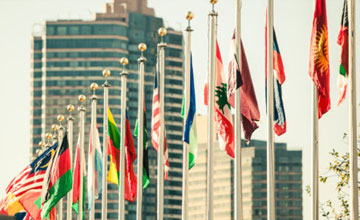
John Kirton
- Courses8
- Reviews22
- School: University of Toronto
- Campus: St. George Campus
- Department: Political Science
- Email address: Join to see
- Phone: Join to see
-
Location:
Toronto, ON - Dates at University of Toronto: November 2004 - January 2020
- Office Hours: Join to see
N/A
Would take again: No
For Credit: No
0
0
Not Mandatory
Awful
Professor Kirton's lectures are nightmares. His arrogance, tangents, and lethargy will make you want to drop your major and get as far away from this school as possible. He is the worst professor I have had at University of Toronto, which is really saying something. Do not take his class!
Biography
University of Toronto St. George Campus - Political Science
University of Toronto, G7 Research Group, G20 Research Group, BRICS Research Group, Global Health Diplomacy Program
Higher Education
John
Kirton
Toronto, Ontario, Canada
Professor John Kirton is director of the G7 Research Group, the G20 Research Group and the Global Health Diplomacy Program and co-director of the BRICS Research Group, all based at Trinity College at the Munk School of Global Affairs and Public Policy at the University of Toronto, and a Non-Resident Senior Fellow at the Chongyang Institute for Financial Studies at China's Renmin University. A professor of political science, he teaches Canadian foreign policy, global governance and international relations. During his sabbatical year from 2012 to 2013, he served as a visiting fellow at the Balsillie School of International Affairs in Waterloo, Canada, and a visiting professor at Kwansei Gakuin University in Japan. He has advised the Canadian and Russian governments, the World Health Organization and the Pan American Health Organization on G7/8 and G20 participation and summitry, international trade and sustainable development, and has written widely on G7/8 and G20 summitry. He is the author of G20 Governance for a Globalized World (Ashgate, 2012), and Canadian Foreign Policy in a Changing World (Thomson Nelson, 2007), among other volumes. He is also co-editor of the Global Governance and Global Environmental Governance series published by Routledge Publishing. Kirton is co-editor of several publications dedicated to the G7, the G20 and the BRICS and published by GT Media.
Experience
BRICS Research Group
Co-director and Founder
John worked at BRICS Research Group as a Co-director and Founder
Global Health Diplomacy Program
Co-director and Founder
John worked at Global Health Diplomacy Program as a Co-director and Founder
G8 Research Group
Director and Founder
John worked at G8 Research Group as a Director and Founder
Munk School of Global Affairs and Public Policy, Trinity College, University of Toronto
Professor
John worked at Munk School of Global Affairs and Public Policy, Trinity College, University of Toronto as a Professor
G20 Research Group
Co-director and Founder
John worked at G20 Research Group as a Co-director and Founder
Education
Norman Paterson School of Public Affairs at Carleton University
Master's degree
International Affairs
University of Toronto
Bachelor's degree
Political Science
The Johns Hopkins University - Paul H. Nitze School of Advanced International Studies (SAIS)
Doctor of Philosophy (PhD)
International Studies
Publications
Canadian Foreign Policy in a Changing World
Thomson Nelson
Canadian Foreign Policy in a Changing World
Thomson Nelson
The Russia G20 Summit: St Petersburg 2013
Newsdesk Media
Canadian Foreign Policy in a Changing World
Thomson Nelson
The Russia G20 Summit: St Petersburg 2013
Newsdesk Media
G20 Governance for a Globalized World
Ashgate
Canadian Foreign Policy in a Changing World
Thomson Nelson
The Russia G20 Summit: St Petersburg 2013
Newsdesk Media
G20 Governance for a Globalized World
Ashgate
Connecting Climate Change and Health Through Global Summitry
World Medical & Health Policy
The strengthening scientific consensus about the connection between climate change and health is not reflected at the relevant organizations of the United Nations (UN). It has been more adequately addressed by the informal Group of Eight (G8). Relative to the G8 with its comprehensive agenda, intermittent UN summits focused on health, environment, or development have lagged in recognizing and responding to the connection. This poorer UN performance is not caused by changes in the scientific consensus, or by severe climate and health shocks, which should spur both summit systems, particularly the UN, to act. It depends more on the comprehensiveness, flexibility, annual occurrence, and compact like-mindedness of the G8 summits compared to the subject-specific, organizationally constrained, intermittent, internally divergent UN ones. This suggests the UN will struggle to transform the Millennium Development Goals into new post-2015 sustainable development goals and define a post-2015 climate change control regime with a closer climate-health connection, unless the G8 and now Group of 20 summits address the connection in a UN-supportive way.
Canadian Foreign Policy in a Changing World
Thomson Nelson
The Russia G20 Summit: St Petersburg 2013
Newsdesk Media
G20 Governance for a Globalized World
Ashgate
Connecting Climate Change and Health Through Global Summitry
World Medical & Health Policy
The strengthening scientific consensus about the connection between climate change and health is not reflected at the relevant organizations of the United Nations (UN). It has been more adequately addressed by the informal Group of Eight (G8). Relative to the G8 with its comprehensive agenda, intermittent UN summits focused on health, environment, or development have lagged in recognizing and responding to the connection. This poorer UN performance is not caused by changes in the scientific consensus, or by severe climate and health shocks, which should spur both summit systems, particularly the UN, to act. It depends more on the comprehensiveness, flexibility, annual occurrence, and compact like-mindedness of the G8 summits compared to the subject-specific, organizationally constrained, intermittent, internally divergent UN ones. This suggests the UN will struggle to transform the Millennium Development Goals into new post-2015 sustainable development goals and define a post-2015 climate change control regime with a closer climate-health connection, unless the G8 and now Group of 20 summits address the connection in a UN-supportive way.
The Global Governance of Climate Change: G7, G20 & UN Leadership
Ashgate
Climate change control has risen to the top of the international agenda. Failed efforts, centred in the United Nations, to allocate responsibility have resulted in a challenge now reaching crisis stage. This book analyses the generation and effectiveness of four decades of intergovernmental regimes for controlling global climate change. Informed by international relations theories and critical of the prevailing UN approach, Kirton and Kokotsis trace the global governance of climate change from its 1970s origins to the present and demonstrate the effectiveness of the plurilateral summit alternative grounded in the G7/8 and the G20. Topics covered include: - G7/8 and UN competition and convergence on governing climate change - Kyoto obligations and the post-Kyoto regime - The role of the G7/8 and G20 in generating a regime beyond Kyoto - Projections of and prescriptions for an effective global climate change control regime for the twenty-first century. With a rich array of empirical data, including new interview and documentary material about G7/8 and G20 governance of climate change, this book makes a valuable contribution to understanding the dynamics of governing climate change. It will appeal to scholars, researchers, and policy makers interested in the dynamics behind governance processes within the intergovernmental realm.
Canadian Foreign Policy in a Changing World
Thomson Nelson
The Russia G20 Summit: St Petersburg 2013
Newsdesk Media
G20 Governance for a Globalized World
Ashgate
Connecting Climate Change and Health Through Global Summitry
World Medical & Health Policy
The strengthening scientific consensus about the connection between climate change and health is not reflected at the relevant organizations of the United Nations (UN). It has been more adequately addressed by the informal Group of Eight (G8). Relative to the G8 with its comprehensive agenda, intermittent UN summits focused on health, environment, or development have lagged in recognizing and responding to the connection. This poorer UN performance is not caused by changes in the scientific consensus, or by severe climate and health shocks, which should spur both summit systems, particularly the UN, to act. It depends more on the comprehensiveness, flexibility, annual occurrence, and compact like-mindedness of the G8 summits compared to the subject-specific, organizationally constrained, intermittent, internally divergent UN ones. This suggests the UN will struggle to transform the Millennium Development Goals into new post-2015 sustainable development goals and define a post-2015 climate change control regime with a closer climate-health connection, unless the G8 and now Group of 20 summits address the connection in a UN-supportive way.
The Global Governance of Climate Change: G7, G20 & UN Leadership
Ashgate
Climate change control has risen to the top of the international agenda. Failed efforts, centred in the United Nations, to allocate responsibility have resulted in a challenge now reaching crisis stage. This book analyses the generation and effectiveness of four decades of intergovernmental regimes for controlling global climate change. Informed by international relations theories and critical of the prevailing UN approach, Kirton and Kokotsis trace the global governance of climate change from its 1970s origins to the present and demonstrate the effectiveness of the plurilateral summit alternative grounded in the G7/8 and the G20. Topics covered include: - G7/8 and UN competition and convergence on governing climate change - Kyoto obligations and the post-Kyoto regime - The role of the G7/8 and G20 in generating a regime beyond Kyoto - Projections of and prescriptions for an effective global climate change control regime for the twenty-first century. With a rich array of empirical data, including new interview and documentary material about G7/8 and G20 governance of climate change, this book makes a valuable contribution to understanding the dynamics of governing climate change. It will appeal to scholars, researchers, and policy makers interested in the dynamics behind governance processes within the intergovernmental realm.
The UK Summit: The G8 at Lough Erne 2013
Newdesk Media







